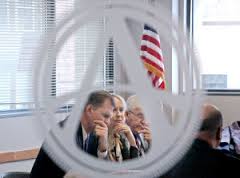GAB now playing secrets in state John Doe lawsuit

By M.D. Kittle | Wisconsin Reporter
MADISON, Wis. — The state Government Accountability Board would like to keep its secrets in the dark, and a Waukesha County judge — for now — has agreed to the agency’s request.
As the Milwaukee Journal Sentinel reported Friday, Waukesha County Circuit Judge Lee Dreyfus Jr. issued an order last week allowing the GAB to black out parts of its response to a lawsuit filed against it on behalf of Wisconsin taxpayers by conservative activist Eric O’Keefe and the Wisconsin Club for Growth.
The judge’s decision could keep the GAB’s secret dealings in a politically charged John Doe investigation into dozens of conservative groups out of the public eye.
But not so fast, says a legal expert with knowledge of the lawsuit.
PAINT IT BLACK: The state Government Accountability Board has asked a judge to black out portions of the agency’s response to a state lawsuit involving the politically charged John Doe investigation. That request may not stand for long, a source tells Wisconsin Reporter.
The expert, who spoke on background, said the judge’s order is not a final decision, and that attorneys for the club expect to argue the merits of the secrecy motion later this month.
Both sides were expected to find out late Monday what the GAB’s request to partially seal its response will mean for the proceedings — in essence, just how much the agency wants blacked out.
Keeping the brunt of the material for the judge’s eyes only would be unprecedented, the legal expert said. Even the Internal Revenue Service isn’t granted that kind of secrecy, the source said.
The GAB, which oversees state campaign and election law, was at the ground level of a multi-county, secret probe into at least 29 conservative organizations on a theory that the groups may have illegally coordinated with Gov. Scott Walker’s campaign during the state’s partisan recall elections drives.
Launched in late summer 2012 by Milwaukee County District Attorney John Chisholm, a Democrat, the politically charged probe, according to court documents, involved GAB contracted investigators Dean Nickel and Francis Schmitz, a former assistant U.S. attorney who subsequently was tapped as the proceeding’s special prosecutor.
In February, O’Keefe and the club filed a civil right lawsuit in federal court, claiming prosecutors had violated conservatives’ First Amendment rights in an investigation that, sources say, involved predawn, “paramilitary-style” raids at the homes of targets.
The plaintiffs followed up the federal lawsuit in late May with the state lawsuit in Waukesha County, alleging the GAB has created a “Frankenstein monster” out of its law enforcement authority.
Wisconsin’s unique John Doe proceedings are designed to allow investigators and a court to determine, generally in secret, whether a crime has been committed. They are similar to grand jury investigations, without the benefit of a jury of peers. Instead, a judge with extraordinary power presides over the probes, compelling witnesses to testify and to keep confidential their involvement, on penalty of contempt of court charges.
GAB officials have constantly declined to comment on the John Doe investigation or the lawsuits, citing the probe’s secrecy order and the $10,000 fine they could incur for doing so.
One legal expert close to the case says the GAB has invoked the secrecy order on multiple occasions insisting that doing so is about protecting the targets of the case.
“At every turn, from the beginning of the John Doe investigation to the federal lawsuit to (the lawsuit in Waukesha County), the accountability board has used these protections to protect themselves,” the source said.
It is safe to say that O’Keefe and the club would not have the raw material to file the state lawsuit against the GAB had the agency not disclosed some very key information, arguably protected under the secrecy order, in other courtrooms.
The GAB has won some secrecy standoffs of late, however.
Last week, Wisconsin Attorney General J.B. Van Hollen issued an opinion that the GAB “may not” turn over its confidential investigative record to the Legislative Audit Bureau because “there is no specific authorization for it to do so.”
In short, state law does not require turning over information the agency claims is confidential. While lawmakers pledged they would fix the loophole, state Sen. Tom Tiffany, R-Hazelhurst, filed an open records request with the attorney general asking for information related to the GAB’s involvement in the John Doe proceedings.
Attorneys for O’Keefe and the Wisconsin Club for Growth, meanwhile, are awaiting a federal district court judge’s ruling on an amended complaint to the civil rights lawsuit. The plaintiffs have asked permission to name the GAB as a defendant, along with Chisholm, Schmitz, Nickel, and two of Chisholm’s assistant DAs.
Andrew Grossman, an attorney for Baker Hostetler, the Washington, D.C-based firm representing the conservatives, says he expects that ruling to come any time. While it is possible that some of the materials the GAB hopes to keep blacked out in state court could be made public in federal court, Grossman said it is not apparent at this point whether those materials are needed in the plaintiff’s federal lawsuit arguments that the GAB interpretation of state campaign finance law is incorrect.







